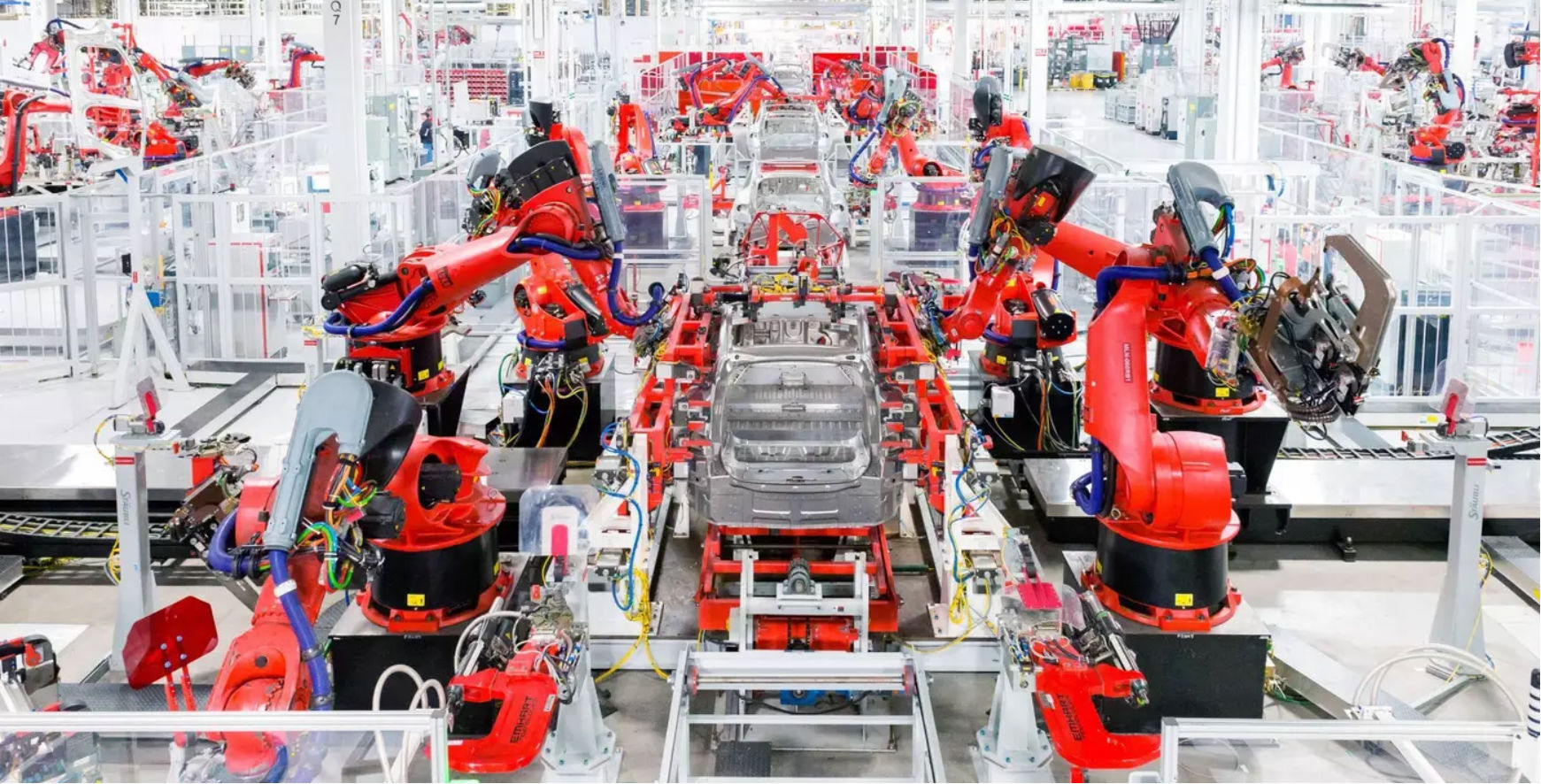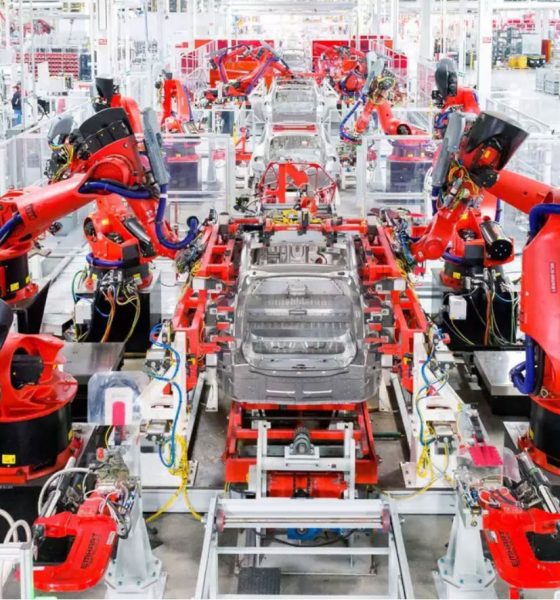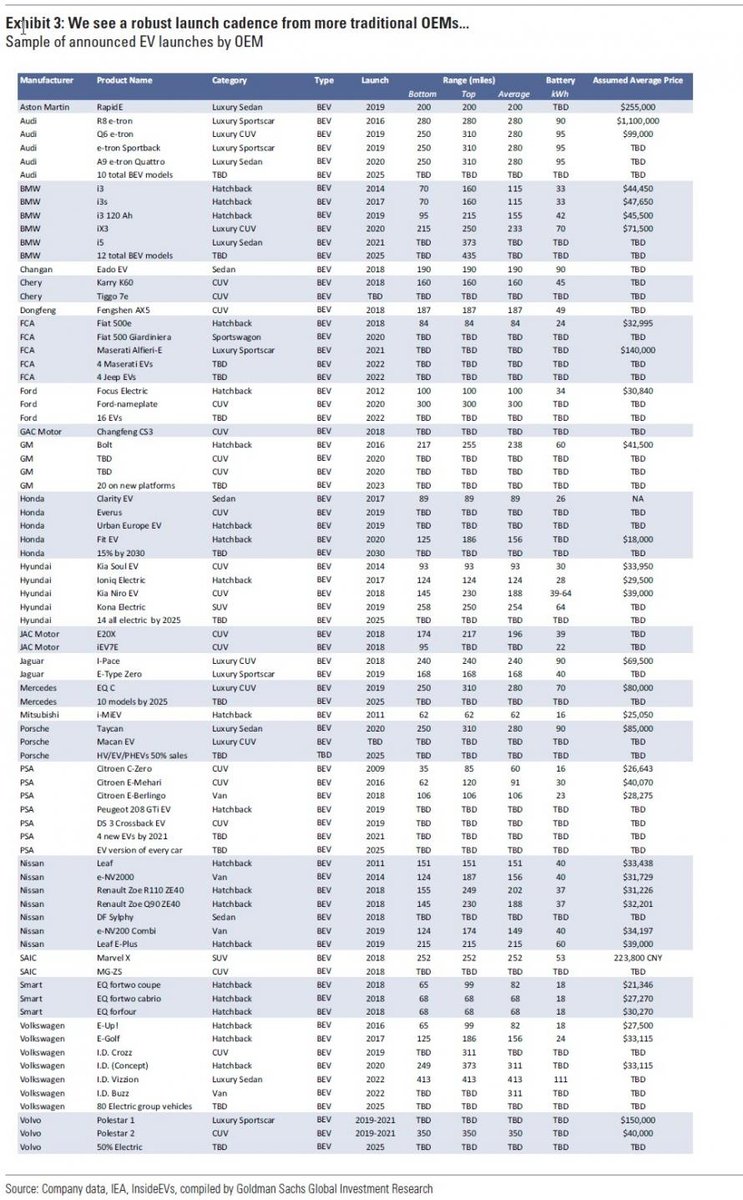

Investor's Corner
Classic Tesla bear thesis gets revived with Goldman Sachs’ latest Sell rating
Just a little over a week after Elon Musk walked away from Tesla’s privatization deal, Goldman Sachs has resumed its coverage of the company. With this renewed coverage comes a strong Sell rating, citing increasing competition from rival carmakers as a reason behind a possible decline in Tesla’s share in the EV market.
A recent note penned by Goldman Sachs analyst David Tamberrino stated that the financial firm believes Tesla stock (NASDAQ:TSLA) would drop 30% in the next 6 months due to the arrival of competing electric vehicles over the next few years. Amidst the release of Goldman Sachs’ note, Tesla shares have taken a 3% drop during Tuesday’s intraday.
“We see the medium-to-longer term industry backdrop as challenging for Tesla’s products; this follows from an increasing number of EV launches from both traditional OEMs and other start-up competitors — at a time when the company’s product cadence hits a gap. We believe the company will see pressure to its lead in EVs as competition catches up,” Tamberrino wrote.
The Goldman Sachs analyst provided a list of some of the electric car makers he believes would be a legitimate threat to Tesla, among them vehicles from BMW, Jaguar, and Porsche, as well as other legacy carmakers that have pledged to release electric cars over the next few years.
“With regional mandates and tightening CO2 standards, both traditional and new entrants are expected to launch several EVs in the coming years — with a large crescendo in the early-to-mid 2020s. Altogether, we remain bearish on the company’s ability to execute, achieve its targeted production ramp/margins, and sustain FCF [free cash flow] generation,” Tamberrino wrote.

It should be noted that the Goldman Sachs analyst has maintained a firm Sell rating on Tesla for a while now. David Tamberrino, for one, has kept his Sell rating on the company since last year, partly causing his rankings in websites such as the TipRanks to suffer. So far, Tamberrino has an average return of -9.0, ranking him as #4,553 out of 4,875 among TipRanks‘ list of Wall St. analysts.
The idea of rival car companies coming up with “Tesla Killers” has been around for a very long time, and over the years, these vehicles have taken many forms. Last year, it was the Chevy Bolt EV being hailed as the Model 3 killer. This year, it’s the Jaguar I-PACE. Next year, it will probably be the Porsche Taycan.
While it is true that these vehicles are legitimate competition for Tesla’s electric cars in terms of quality and performance, their usually limited production numbers prevent them from actually having a shot at toppling the Model S, X, and 3 from their spots at the top of the premium EV market. Chevy, for one, has not really pushed the production of the Bolt this year, Jaguar is reportedly planning to produce up to 30,000 units of the I-PACE annually, and Porsche has revealed that the initial production of the Taycan would be at 20,000 cars per year. Tesla, even at its present state where it is still refining its Model 3 production, is looking to produce around 50,000-55,000 Model 3 this Q3 2018. That’s practically the planned annual production of the Taycan and the I-PACE combined.
Besides, the idea of electric cars “killing” an electric car maker is flawed at its core. Tesla’s electric vehicles, after all, are a step towards sustainability. Thus, if other manufacturers are designing their electric cars in the same way that Tesla is, then they should not be releasing vehicles that are designed to “kill” other electric cars — they should be creating vehicles that are designed to “kill” gas and diesel-powered automobiles.
As of writing, Tesla shares are trading down 3.25% at $291.70 per share.
Disclosure: I have no ownership in shares of TSLA and have no plans to initiate any positions within 72 hours.

Elon Musk
SpaceX IPO could push Elon Musk’s net worth past $1 trillion: Polymarket
The estimates were shared by the official Polymarket Money account on social media platform X.

Recent projections have outlined how a potential $1.75 trillion SpaceX IPO could generate historic returns for early investors. The projections suggest the offering would not only become the largest IPO in history but could also result in unprecedented windfalls for some of the company’s key investors.
The estimates were shared by the official Polymarket Money account on social media platform X.
As noted in a Polymarket Money analysis, Elon Musk invested $100 million into SpaceX in 2002 and currently owns approximately 42% of the company. At a $1.75 trillion valuation following SpaceX’s potential $1.75 trillion IPO, that stake would be worth roughly $735 billion.
Such a figure would dramatically expand Musk’s net worth. When combined with his holdings in Tesla Inc. and other ventures, a public debut at that level could position him as the world’s first trillionaire, depending on market conditions at the time of listing.
The Bloomberg Billionaires Index currently lists Elon Musk with a net worth of $666 billion, though a notable portion of this is tied to his TSLA stock. Tesla currently holds a market cap of $1.51 trillion, and Elon Musk’s currently holds about 13% to 15% of the company’s outstanding common stock.
Founders Fund, co-founded by Peter Thiel, invested $20 million in SpaceX in 2008. Polymarket Money estimates the firm owns between 1.5% and 3% of the private space company. At a $1.75 trillion valuation, that range would translate to approximately $26.25 billion to $52.5 billion in value.
That return would represent one of the most significant venture capital outcomes in modern Silicon Valley history, with a growth of 131,150% to 262,400%.
Alphabet Inc., Google’s parent company, invested $900 million into SpaceX in 2015 and is estimated to hold between 6% and 7% of the private space firm. At the projected IPO valuation, that stake could be worth between $105 billion and $122.5 billion. That’s a growth of 11,566% to 14,455%.
Other major backers highlighted in the post include Fidelity Investments, Baillie Gifford, Valor Equity Partners, Bank of America, and Andreessen Horowitz, each potentially sitting on multibillion-dollar gains.
Elon Musk
Elon Musk hints Tesla investors will be rewarded heavily
“Hold onto your Tesla stock. It’s going to be worth a lot, I think. That’s my bet,” Musk said.

Elon Musk recently hinted that he believes Tesla investors will be rewarded heavily if they continue to hold onto their shares, and he reiterated that in a new interview that the company released on its social accounts this week.
Musk is one of the most successful CEOs in the modern era and has mammothed competitors on the Forbes Net Worth List over the past year as his holdings in his various companies have continued to swell.
Tesla investors, especially those who have been holding shares for several years, have also felt substantial gains in their portfolios. Over the past five years, the stock is up over 78 percent. Since February 2019, nearly seven years ago to the day, the stock is up over 1,800 percent.
Musk said in the interview:
“Hold onto your Tesla stock. It’s going to be worth a lot, I think. That’s my bet.”
Elon Musk in new interview: “Hold on to your $TSLA stock. It’s going to be worth a lot, I think. That’s my bet.” pic.twitter.com/cucirBuhq0
— Sawyer Merritt (@SawyerMerritt) February 26, 2026
It’s no secret Musk has been extremely bullish on his own companies, but Tesla in particular, because it is publicly traded.
However, the company has so many amazing projects that have an opportunity to revolutionize their respective industries. There is certainly a path to major growth on Wall Street for Tesla through its various future projects, including Optimus, Cybercab, Semi, and Unsupervised FSD.
- Optimus (Tesla’s humanoid robot): Musk has discussed its potential for tasks like childcare, walking dogs, or assisting elderly parents, positioning it as a massive long-term driver of company value.
- Cybercab (Tesla’s robotaxi/autonomous ride-hailing vehicle): a fully autonomous vehicle geared specifically for Tesla’s ride-sharing ambitions.
- Semi (Tesla’s electric truck, with mentions of expansion, like in Europe): brings Tesla into the commercial logistics sector.
- Unsupervised FSD (Full Self-Driving software achieving full autonomy without human supervision): turns every Tesla owner’s vehicle into a fully-autonomous vehicle upon release
These projects specifically are some of the highest-growth pillars Tesla has ever attempted to develop, especially in Musk’s eyes, as he has said Optimus will be the best-selling product of all-time.
Many analysts agree, but the bullish ones, like Cathie Wood of ARK Invest, are perhaps the one who believes Tesla has incredible potential on Wall Street, predicting a $2,600 price target for 2030, but this is not even including Optimus.
She told Bloomberg last March that she believes that the project will present a potential additive if Tesla can scale faster than anticipated.
Elon Musk
Tesla stock gets latest synopsis from Jim Cramer: ‘It’s actually a robotics company’
“Turns out it’s actually a robotics and Cybercab company, and I want to buy, buy, buy. Yes, Tesla’s the paper that turned into scissors in one session,” Cramer said.

Tesla stock (NASDAQ: TSLA) got its latest synopsis from Wall Street analyst Jim Cramer, who finally realized something that many fans of the company have known all along: it’s not a car company. Instead, it’s a robotics company.
In a recent note that was released after Tesla reported Earnings in late January, Cramer seemed to recognize that the underwhelming financials and overall performance of the automotive division were not representative of the current state of affairs.
Instead, we’re seeing a company transition itself away from its early identity, essentially evolving like a caterpillar into a butterfly.
The narrative of the Earnings Call was simple: We’re not a car company, at least not from a birds-eye view. We’re an AI and Robotics company, and we are transitioning to this quicker than most people realize.
Tesla stock gets another analysis from Jim Cramer, and investors will like it
Tesla’s Q4 Earnings Call featured plenty of analysis from CEO Elon Musk and others, and some of the more minor details of the call were even indicative of a company that is moving toward AI instead of its cars. For example, the Model S and Model X will be no more after Q2, as Musk said that they serve relatively no purpose for the future.
Instead, Tesla is shifting its focus to the vehicles catered for autonomy and its Robotaxi and self-driving efforts.
Cramer recognizes this:
“…we got results from Tesla, which actually beat numbers, but nobody cares about the numbers here, as electric vehicles are the past. And according to CEO Elon Musk, the future of this company comes down to Cybercabs and humanoid robots. Stock fell more than 3% the next day. That may be because their capital expenditures budget was higher than expected, or maybe people wanted more details from the new businesses. At this point, I think Musk acolytes might be more excited about SpaceX, which is planning to come public later this year.”
He continued, highlighting the company’s true transition away from vehicles to its Cybercab, Optimus, and AI ambitions:
“I know it’s hard to believe how quickly this market can change its attitude. Last night, I heard a disastrous car company speak. Turns out it’s actually a robotics and Cybercab company, and I want to buy, buy, buy. Yes, Tesla’s the paper that turned into scissors in one session. I didn’t like it as a car company. Boy, I love it as a Cybercab and humanoid robot juggernaut. Call me a buyer and give me five robots while I’m at it.”
Cramer’s narrative seems to fit that of the most bullish Tesla investors. Anyone who is labeled a “permabull” has been echoing a similar sentiment over the past several years: Tesla is not a car company any longer.
Instead, the true focus is on the future and the potential that AI and Robotics bring to the company. It is truly difficult to put Tesla shares in the same group as companies like Ford, General Motors, and others.
Tesla shares are down less than half a percent at the time of publishing, trading at $423.69.








